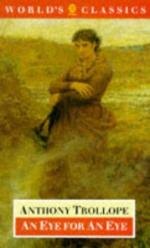Jack Neville.
John is a very respectable name;—perhaps there is no name more respectable in the English language. Sir John, as the head of a family, is certainly as respectable as any name can be. For an old family coachman it beats all names. Mr. John Smith would be sure to have a larger balance at his banker’s than Charles Smith or Orlando Smith,—or perhaps than any other Smith whatever. The Rev. Frederic Walker might be a wet parson, but the Rev. John Walker would assuredly be a good clergyman at all points, though perhaps a little dull in his sermons. Yet almost all Johns have been Jacks, and Jack, in point of respectability, is the very reverse of John. How it is, or when it is, that the Jacks become re-Johned, and go back to the original and excellent name given to them by their godfathers and godmothers, nobody ever knows. Jack Neville, probably through some foolish fondness on his mother’s part, had never been re-Johned,—and consequently the Earl, when he made up his mind to receive his sister-in-law, was at first unwilling to invite his younger nephew. “But he is in the Engineers,” said Lady Scroope. The argument had its weight, and Jack Neville was invited. But even that argument failed to obliterate the idea which had taken hold of the Earl’s mind. There had never yet been a Jack among the Scroopes.
When Jack came he was found to be very unlike the Nevilles in appearance. In the first place he was dark, and in the next place he was ugly. He was a tall, well-made fellow, taller than his brother, and probably stronger; and he had very different eyes,—very dark brown eyes, deeply set in his head, with large dark eyebrows. He wore his black hair very short, and had no beard whatever. His features were hard, and on one cheek he had a cicatrice, the remains of some misfortune that had happened to him in his boyhood. But in spite of his ugliness,—for he was ugly, there was much about him in his gait and manner that claimed attention. Lord Scroope, the moment that he saw him, felt that he ought not to be called Jack. Indeed the Earl was almost afraid of him, and so after a time was the Countess. “Jack ought to have been the eldest,” Fred had said to his aunt.
“Why should he have been the eldest?”
“Because he is so much the cleverest. I could never have got into the Engineers.”
“That seems to be a reason why he should be the youngest,” said Lady Scroope.
Two or three other people arrived, and the house became much less dull than was its wont. Jack Neville occasionally rode his brother’s horses, and the Earl was forced to acknowledge another mistake. The mother was very silent, but she was a lady. The young Engineer was not only a gentleman,—but for his age a very well educated gentleman, and Lord Scroope was almost proud of his relatives. For the first week the affair between Fred Neville and Miss Mellerby really seemed to make progress.




